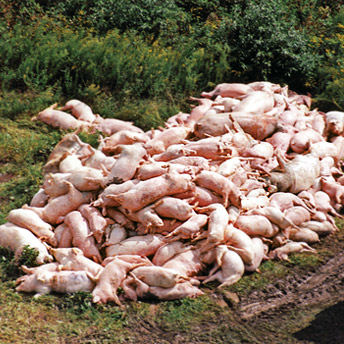"We cannot avoid the conclusion that our irresponsible industrial production and consumption-driven economy lie at the heart of the current environmental crisis."
"Privileged Christians in our present global context need to move from a culture of consumerism to a culture of conservation and sharing."
"The challenge is to examine one's own participation in ecologically destructive habits."
- from A Pastoral Teaching on the Environment, The Episcopal Church House of Bishops Theology Committee
"Privileged Christians in our present global context need to move from a culture of consumerism to a culture of conservation and sharing."
"The challenge is to examine one's own participation in ecologically destructive habits."
- from A Pastoral Teaching on the Environment, The Episcopal Church House of Bishops Theology Committee
I don't want to think about barbecue chicken pizza and pork chops as moral issues, but they are.
What I put in my mouth is a statement about who I am and what I believe.
Yesterday, I approached a vendor at my local Farmer's Market whose posters advertised, "Local pork." I selected zesty Italian sausage and chorizo, made the purchase, and was about to turn to leave when I decided to ask a question that the documentary "Food, Inc." had convinced me to ask.
"I have a question, if you have a minute."
"Sure," the young farmer said, taking a seat on the stool behind the cash box.
"So, I saw a documentary," I said, feeling my cheeks flush, "and I wanted to ask you how you raise and care for your pigs. Because the documentary had all this information about how horrible the industrial food system is, and it made me very concerned about where my meat comes from."
"Well, my pigs only see one bad day," he said. "Only one bad day. And it's their last day."
I smiled.
"My pigs are not kept indoors; they never see concrete or asphalt unless they escape. They roam freely outdoors. I bring the mothers inside when they are about to give birth, but still, they are given a large pen where they can move freely, unconstrained. They never see a cage."
"That makes me feel so much better," I said. "I used to buy vegetables at the market, and conventional meat from the grocery, but I don't think I'll ever buy conventional meat again."
"You know how they started calling pork 'the other white meat?'" he asked. "The meat became white because industrial farming doesn't allow the pigs to move. They stand still all day, building up fat and bulk with hormones and antibiotics, and they don't develop muscle. When you cook up one of my pork chops, you'll see it's not white. It's not red like red meat, but it's not white - because my meat is not all fat. My pigs build muscle."
"That chorizo you bought there," he said, "if you cook that up in a pan and try to drain the excess fat, nothing will drain. There's no excess fat there. It's good, lean meat."
And he was right. I cooked up the chorizo - two links on the grill and some bulk chorizo in the frying pan - and there was no fat to drain. No neon orange grease to soak up on a mound of paper towels.
Just good, farm-fresh, lean meat.
"Our
current environmental challenges call us to ongoing forms of
repentance: we must turn ourselves around, and come to think, feel, and
act in new ways. Ancient wisdom and spiritual disciplines from our
faith offer deep resources to help address this environmental crisis.
Time-honored practices of fasting, Sabbath-keeping, and Christ-centered
mindfulness bear particular promise for our time."
My deepest hope is that this newest endeavor to act in new ways, and purchase my food locally and mindfully, will continue.
In my role as a deputy to General Convention, I take time to read hundreds of pages of reports issued by various bodies in The Episcopal Church. While I am so very proud that our House of Bishops issued a pastoral report on the environment, I am so very disappointed that the issues raised by the report are not a topic of normal discussion in our parishes and missions.
Where are the sermons that make a connection between the commandment to keep the Sabbath and the industrial food system? Where are the sermons that draw the connection between obesity, corn subsidies, and poverty in developing countries?
Where are everyday Episcopalians in this dialogue?


